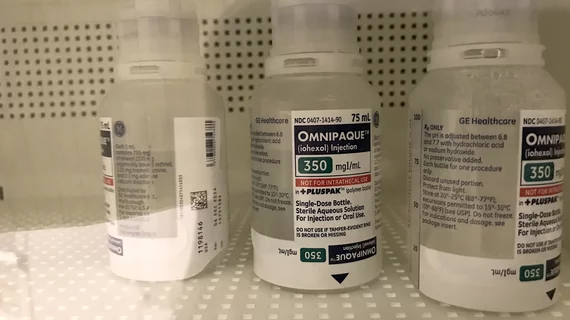Contrast shortage update: GE expects supply to 'progressively recover' soon
After weeks of scrambling to maintain iodinated contrast media supplies, practices might soon be allowed to ease their mitigation tactics.
That’s according to the most recent word from GE. In the update, GE said that the production capacity at its Shanghai facility should be near 100% starting on June 6. This comes following the recent easing of local COVID-19 restrictions in the city that drastically decreased contrast production and sent radiology departments across the country into a tailspin beginning in late March.
“This will enable us to restabilize our global supply of iodinated contrast media. We will continue to work with impacted customers to help them plan several weeks ahead as supply progressively recovers,” the statement reads.
As previously reported, GE initially expected the supply shortages to last until mid-June. This sent radiology departments, professional societies and even the U.S. government into crisis mode in an attempt to preserve iodinated contrast supplies for the patients who needed it most urgently, while also revisiting and revising protocols involving the use of ICM and seeking out suitable substitutions.
The shortage has impacted countless patients who have had their medical imaging exams and procedures delayed and has caused many in the field to take a deeper look at how to avoid such consequential supply deficits in the future.
While those efforts are likely to continue, it appears as though the immediate situation should begin to improve as soon as next week.
Health Imaging will continue to provide updates on the contrast media shortages as they become available.
Read GE’s full update here.
More contrast media news:
Preserving contrast media supplies: 7 ACR recommendations
ACR working with FDA and HHS to help address imaging contrast shortage
VIDEO: Imaging contrast shortage is delaying procedures and causing rationing
Gadolinium can be used as substitute for iodine contrast in some interventional imaging procedures
VIDEO: How the iodine contrast shortage is impacting interventional cath labs

